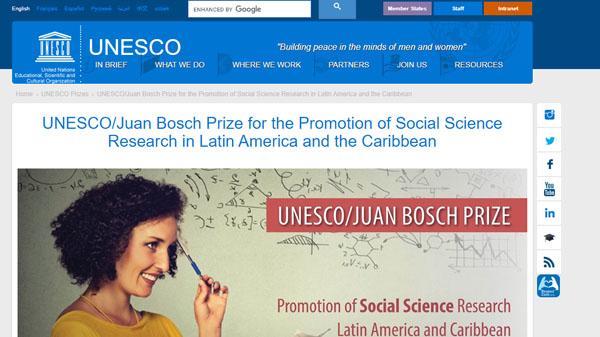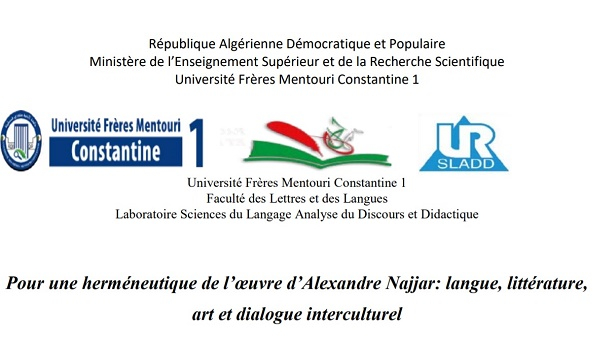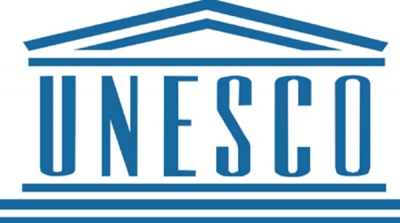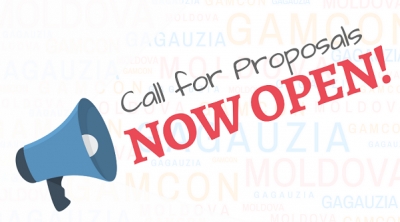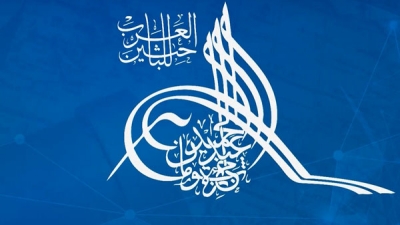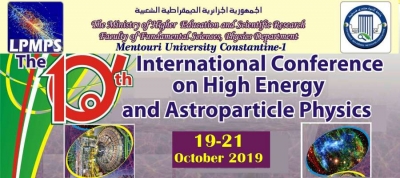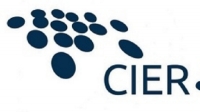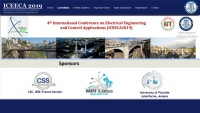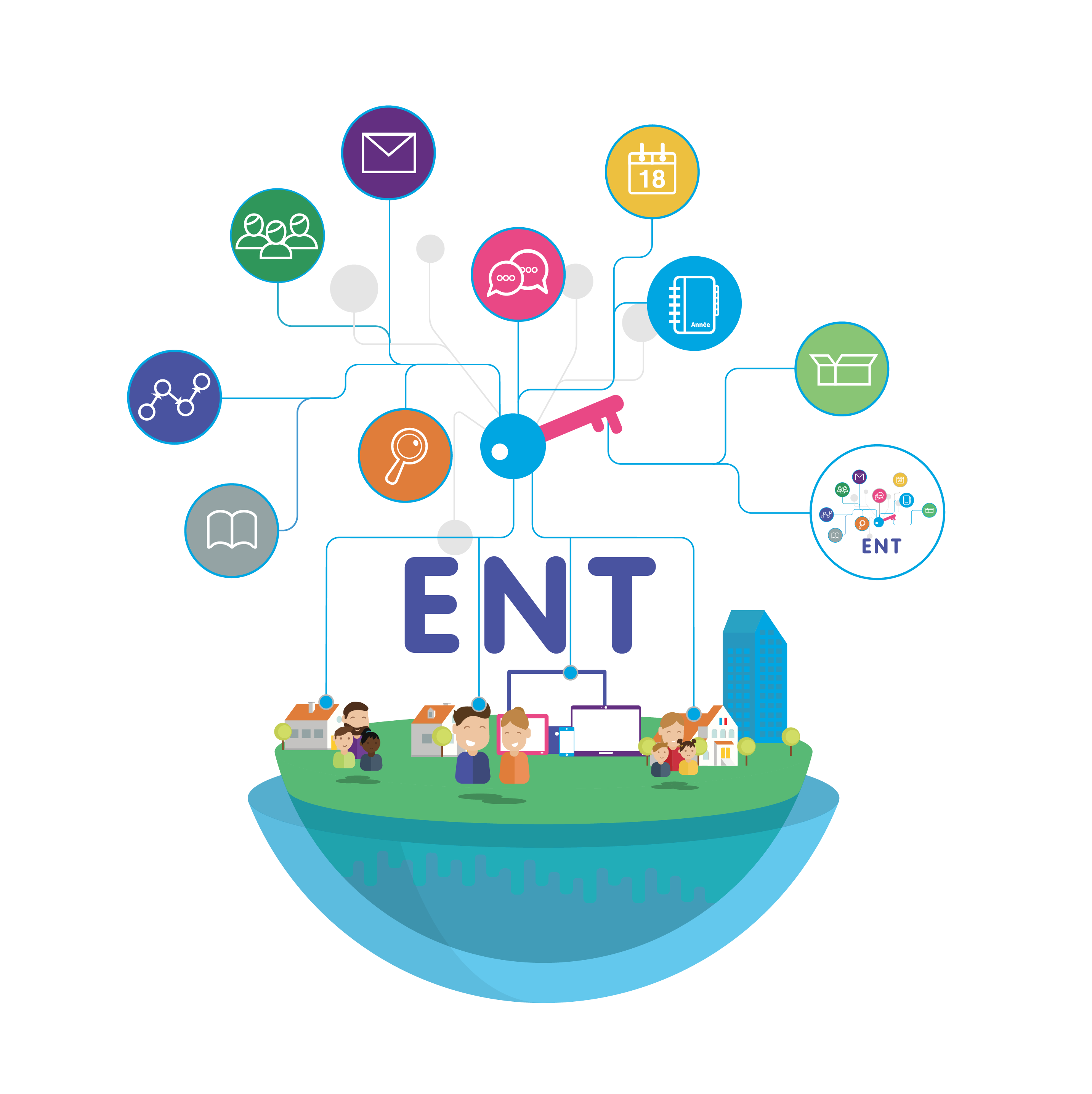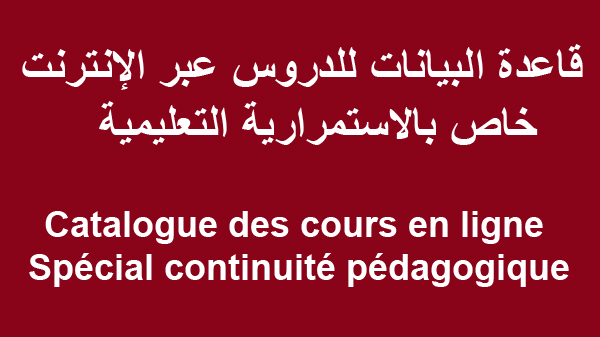
Call for papers 36
Appel à candidatures du prix UNESCO / Juan Bosch Pour la promotion de la recherche en sciences sociale en Amérique Latine et dans les caraïbes, édition 2021
Thursday, 17 June 2021 13:08 Written by Redaction webL’organisation des Nations Unies pour l’éducation, la science et la culture UNESCO lance un appel à candidatures au prix UNESCO / Juan Bosch pour la promotion de la recherche en sciences sociales en Amérique Latine et dans les caraïbes, édition 2021 .
Ce prix d’une valeur de 12 000 USD, financé par la République Dominicaine vise à récompenser des travaux de recherche menés par de jeunes chercheurs en sciences sociale, orientés vers les politiques de développement social en lien avec l’Amérique Latine et les caraïbes.
Les candidatures doivent être soumettre par courriel avant le 31 juillet 2021 à l’adresse électronique suivante : This email address is being protected from spambots. You need JavaScript enabled to view it.
Pour plus d’informations sur ce prix et sur la procédure de candidature, veuillez consulter le lien : https://en.unesco.org/prizes/juan_bosch
Appel à communication colloque international à l’œuvre d’Alexandre Najjar 25 et 26 mai 2021
Thursday, 01 April 2021 10:38 Written by Redaction Web 1Dans le cadre de ses activités scientifiques, le laboratoire Sciences du Langage Analyse du Discours et Didactique consacre ce colloque international à l’œuvre d’Alexandre Najjar. Invité d’honneur de cette manifestation scientifique, Alexandre Najjar inaugurera les travaux par une conférence qui témoignera aussi bien de sa pratique d’écriture, de toute la pensée humaniste de son œuvre ainsi que de ses rapports aux langues.
Romancier, essayiste, dramaturge et biographe Alexandre Najjar est une figure de proue de la culture au Liban. Avocat et écrivain francophone dont l’œuvre polymorphe, foisonnante, souvent militante, innovante presque toujours, est le reflet d’une intense activité intellectuelle exposant les grands débats qui agitent et traversent le siècle à travers une pensée ouverte à l’altérité, au dialogue interculturel et à l’universel. « Comme la lecture, l’écriture est un voyage » 1 , elle est également un hymne à la paix et la fraternité, un acte de foi fervent dans les valeurs conjuguées de la liberté et le fondement d’une sagesse et un art de vivre collectif. C’est dans cette « poétique des valeurs » que semble s’inscrire toute l’œuvre d’Alexandre Najjar, une œuvre métaphorique des ambitions de son auteur, somme toute d’un humanisme « comme dernier rempart contre les pratiques inhumaines et les injustices qui défigurent l’histoire de l’humanité » tel que le conçoit Edouard Saïd.2 Alexandre Najjar nous conduit dans le Caucase de la seconde moitié du XIXème siècle, en Jordanie en quête de communautés oubliées, nous invite dans la Florence des Médicis pour nous raconter le récit d’une double rencontre entre Orient et Occident, nous emmène en Grèce pour narrer la Méditerranée, à Chicago et en Allemagne nazie pour un réquisitoire contre le racisme et le terrorisme intellectuel, en France pour un plaidoyer contre la censure… et au Liban pour raconter son « petit pays au grand destin ». Protéiforme, son œuvre offre un large éventail de thématiques traitant, à l’instar d’une rhétorique accusatrice, de l’impérialisme, du colonialisme, de la dichotomie Orient/Occident, de la réalité des Levantins…méditant longuement sur la dictature et la justice, la mégalomanie et la modestie, la tolérance et la discrimination d’une Histoire mouvementée et d'un monde de plus en plus complexe à travers les portraits saisissants de saccageurs mais aussi des grands inspirateurs ayant défendu et illustré les courageuses vérités de l’esprit.
En considérant l’expression artistique comme une dimension constitutive de la mémoire et comme un moyen particulier d’appréhender le monde, le passé et le présent, cette journée d’étude réunira des contributions consacrées à la langue, à la littérature, à l’art et à la culture dans une conception herméneutique3 et une perspective transdisciplinaire.
L’intérêt de ce colloque international est de capter un corpus exemplaire d’une conception stable et durable dans l’expression artistique, d’exposer des problématiques fondamentales de l’existence et d’aborder la fonction esthétique du texte en prenant en compte le contexte historique et culturel. Ainsi formulé, cet argumentaire invite des chercheurs et des spécialistes à réfléchir sur le style qui s’impose comme un absolu, -la condition même de l’écriture. Ce sera là l’hypothèse avec, comme corollaire, une analyse du rapport à l’art, à l’écriture, au monde, à la formation de soi, à la culture et aux langues.
Cette rencontre scientifique invite les chercheurs à réfléchir et à débattre sur l’œuvre d’Alexandre Najjar en interrogeant sa pratique d’écriture, les thématiques qu’il aborde et sa pensée humaniste, ses rapports aux langues tant du point de vue de leurs pratiques que du point de vue de leur enseignement/apprentissage. Des témoignages sur l’auteur contribueront à enrichir les débats.
Comité Scientifique
Pr.Ahmed BOUALILI (Université Mouloud Mammeri, Tizi Ouzou)
Pre. Zeineb BEN GHEDAHEM (École Polytechnique de Tunis)
Dr.Nabila BEDJAOUI (Université Mohamed Kheider.Biskra)
Pr. Samira BOUBAKOUR (Université Batna 2)
Dr.Meriem BOUGHACHICHE (Université Frères Mentouri Constantine 1)
Pr. Nedjma CHERRAD (Université Frères Mentouri. Constantine 1)
Pr. Yasmina CHERRAD (Université Frères Mentouri. Constantine 1)
Pr.Yacine DERRADJI (Université Frères Mentouri.Constantine 1)
Pr.Laarem GUIDOUM (Université Frères Mentouri.Constantine 1)
Pr. Ilham HOTEIT, (Université Libanaise)
Pr. Fouad LAROUSSI (Université de Rouen Normandie).
Pr.Ali. KAZWINI-HOUSSEINI (Université Libanaise)
Pr.Sophie NICOLAIDES-SALLOUM, (Université Arabe de Beyrouth)
Comité d’organisation
Hanane AOUN, Meriem BOUGHACHICHE, Khaoula BENLAHLOUH, Mahdi BENDIAB, Antar BENSAKESLI, AISSANI Radouane, Lilia BOUMENDJEL, Cherifa CHENTLI, Nedjma CHERRAD, Imane CHOUAR Cherif SOUTI, Louisa IKEN, Chafik ZAGHNOUF
Les propositions de communication ou les témoignages envoyés ne doivent pas dépasser les 500 mots. Les propositions de communication ou les témoignages doivent être envoyés à l’adresse mail suivante : This email address is being protected from spambots. You need JavaScript enabled to view it. La date limite d’envoi est le 25 avril 2021 Les langues du colloque sont le français, l’arabe et l’anglais. Les interventions et/ou les témoignages se feront en présentiel pour les participants des universités de Constantine et par webinaire pour les participants des universités extérieures.
Mobile Learning Week 2019: Call for proposals open
Monday, 30 September 2019 09:57 Written by Redaction web 2Mobile Learning Week 2019: Call for proposals open
Mobile learning week 2019: call for proposals open
Monday, 03 December 2018 09:57 Written by Redaction web 2The Scientific Committee of the Abdul Hameed Shoman Award for Arab Researchers - Abdul Hameed Shoman Foundation announces the opening of the nomination for the award for the 2019 edition, which amounts to $ 20,000 twenty thousand dollars. The award recognizes outstanding scientific output in the five years prior to the nomination.This publication will lead to an increase in scientific and applied knowledge, contribute to solving priority problems locally, regionally and globally, and disseminate a culture of scientific research.The deadline for acceptance of applications is 31 March 2019. Fields and themes for the 2019 session: (Medical and Health Sciences) in the following topics: 1. Molecular Genetics: Including genetics of diseases, gene therapy, genetic engineering, genomics, genetic diagnosis 2. Progress in the Treatment of Life-Threatening Diseases Field of Basic Sciences) in the following subjects: 1. Mathematical Modelling 2. Physical Chemistry Field of technological and agricultural sciences in the following topics 1. Arabic Natural Language Processing including Tools, Utilities, and Helping Computers to Process and Understand Arabic Language Documents and Artifacts (such as: Speech, and Text) 2. Bio-Informatics and Other Uses of IT & Big Data in Biology, Biomedical Engineering, Medicine and Healthcare Field of Engineering Sciences in the following subjects: 1. Renewable and Sustainable Energy 2. Earthquake Engineering Technology Humanities, Social and Educational Sciences in the following topics 1. Strategies for developing Education in the Arab World 2. Media Industry in the Internet Era The field of economic and administrative sciences in the following subjects: 1. Strategic Planning and its Impact on Public Administration 2. Islamic Economy Nomination for the Award is done through the electronic system (click here) after reviewing the nomination conditions, by following the following steps: * Please note that the electronic system works on all Internet browsers, except (Internet Explorer) Create an account on the mail system and activate the account and login using your username and password. To learn how to apply online, click here to view the introductory video. Enter personal data, contact information and address. Enter work information and educational qualifications. Enter the scientific output information presented to the Award. Download the required attachments. Selection of pledge and application. https://www.shoman.org As the first Arab award for scientific research and celebrates Arab researchers, the Abdul Hameed Shoman Foundation launched the Arab Researchers Award in 1982. The Foundation seeks to support and highlight scientific research throughout the Arab world, and to participate in the preparation and inspiration of a generation of Arab researchers, experts and specialists in the various scientific fields. Under the limited possibilities of institutions, universities and individuals. Many of the winners of the Abdul Hameed Shoman Award for Arab Researchers have achieved remarkable scientific achievements after receiving the award. Research and push for solutions to practical problems on the ground. Throughout its 35-year history, the Abdul Hameed Shoman Award for Arab Researchers has been able to enjoy objectivity and credibility among Arab researchers and a reputation in the Arab academic community. This award recognizes outstanding scientific output that increases its scientific and applied knowledge, contributes to solving priority problems locally, regionally and globally, and disseminates a culture of scientific research. This is done in six fields approved by the scientific body of the Award, and determines the disciplines that are announced to compete in each of them, and these fields include: Medical and Health Sciences. Engineering Sciences. Basic Science. Arts, Humanities, Social and Educational Sciences. Technological and Agricultural Sciences. Economic and Administrative Sciences Many of the winners of the Abdul Hameed Shoman Award for Arab Researchers have achieved outstanding scientific achievements after receiving the award, and some of them have assumed a prestigious or public place in their countries. Development stages of the Award: 1982: The Abdul Hameed Shoman Award for Young Arab Researchers was launched. 1983: 5 awards 1984: 7 awards 1991: 9 awards - 1993: 10 prizes worth 5,000 dinars each - 1995: 12 awards - 2002: 6 awards, the value of each award $ 10,000, raising the upper limit of the age of the candidate from 40 years to become 45 years - 2011: 6 awards, the value of each prize 15 thousand dollars - 2013: New foundations for the award were laid: All candidates should be allowed to apply without any age limit. The name of the award became: "Abdul Hameed Shoman Award for Arab Researchers". All scientific disciplines were limited to six major fields instead of twelve. - 2014: 12 awards - 2017: 35 years since the tender process of scientific research and Arab researchers. Evaluation: The evaluation of the scientific output submitted and accepted for the award shall be conducted by arbitration committees composed by the scientific body of the Award with experience and adequacy based on criteria that ensure the objectivity and credibility of the results of the award, and its decisions are final and may not be challenged. The committees shall make their decisions to select or withhold the prize winners Award Components: A certificate containing the name of the award, the name of the winner, and the field in which he won. 2- A financial reward of (20,000) twenty thousand US dollars. 3 - Shield bearing the name and logo of the award. If two winners are entitled to one prize, each will be awarded a certificate and a shield, in addition to the financial reward which is equally divided among the winners. Abdul Hameed Shoman Foundation announces the winners of the prize by appropriate means, at a date to be determined each year and a special ceremony is held to award the award
International conference High Energy and astroparticle physics
Sunday, 14 July 2019 09:47 Written by Redaction web 2This Tenth edition of International Conference on High Energy and Astroparticle Physics (TIC-HEAP) is set to be held at Mentouri University, Constantine in Algeria during the period of 19 to 21 octobre 2019 (Including the optional touristic trip on the 2nd of April). Held in close coordination with the DGRSDT (The Algerian General Direction of Scientific Research), it will focus on discussing the latest development on particle physics, astroparticle and cosmology, as well as strategically planning for Algeria to become an active participating member of the CERN. It is timely for the Algerian particle physics community to join some of the LHC collaborations as well as other international experiments in experimental particle physics and in particular the Astroparticle physics ones like ANTARES experiment and the like. This is why we wish to associate to this meeting to the fullest extent young researchers worldwide as well as our sprouting particle physics community both locally based and from the Diaspora.
Topics
- Particle Physics
- Collider Physics and Particle Detectors
- Astroparticle & Cosmology
- Grid Computing in HEP
- Special Topics in Theoretical Physics (Mathematical Physics, Quantum Information, Chaos Theory, ...)
The topics will cover particle physics and related fields as well as accelerator physics from both a theoretical and an experimental point of view, as well as some related fields like Cosmology, HEP-GRID computing, while allowing for some theoretical physics topics for inclusiveness. In addition, we hope to set up new research collaborations and enhance existing ones. It will devote some time to discuss in an open session the practical ways to establish a stronger CERN connection in the light of the CERN-Algeria protocol, all in the presence of important actors from the CERN and ICTP and under the auspices of the DGRSDT (General Direction of Scientific Research).
We will also organize during the Conference an innovative "Cirta-Contest" as well as an HEP Masterclass for the benefit of the physics graduate students of our University and various other Algerian universities (Links will appear soon).
=> Inscription: (International conference Hight energy and astroparticle physics)
7th International Conference on Renewable Energies (CIER-2019)
Wednesday, 11 September 2019 09:44 Written by Redaction web 2ICEECA’19 - Fourth International Conference on Electrical Engineering And Control Applications
Sunday, 24 March 2019 08:51 Written by Redaction webDecember, 17-19, 2019, Constantine, Algeria
Welcome to the International Conference on Electrical Engineering and Control Applications (ICEECA’2019).
The Fourth International Conference on Electrical Engineering and Control Applications (ICEECA’19) provides a forum for specialists and practitioners to present and discuss their research results in the several areas of the conference, and also state of the art findings in using the applied electrical engineering and automatic control to solve national problems that face developing countries. The conference ICEECA’19 publishes papers on theoretical analysis, experimental studies and applications in the domain of automatic control and computer engineering. The objective of the conference is not only the exchange of knowledge and experience, since the conference is an open door to students, but also provides opportunities for researchers to target future collaboration on current issues.
The conference attracts participants in a diverse range of fields, including Control and systems engineering, Renewable Energy, Faults Diagnosis-Faults Tolerant Control, Large Scale Systems, Unconventional algorithms in control engineering, Signal and Communications and some other related fields.


